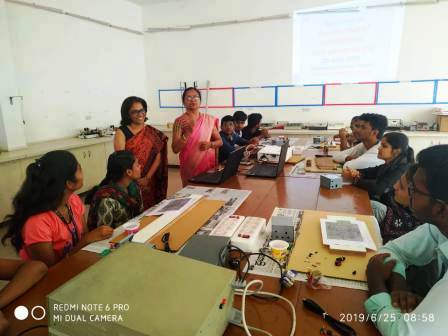Department of Physics
About Department:
- Dr.R. Ananda kumari has organizing INSPIRE Nurturing Camp every year for P.U Students Studying in different Colleges of Tumkur District .Nearly 200 Students benefiting from this program.
- C.S.Somashekharaiah emerged as a resource person and he is giving a special lecture on different topics for B.Sc. students in the various colleges. Now Prof. C S S working as a IQAC coordinator.
- S.Shashidhara working as a head of the Department and is the coordinator of N.S.S units, Students Welfare Association, and member of the Sports Committee..
G.R.Revannasiddappa awarded Ph.D. in Sri Siddhartha University and is present papers in the different National and International conferences. and he is the convenor of prevention of Caste based Discrimination

Our Vision
To create interest and scientific attitude among the student community towards understanding the “Nature and the physical phenomena”
Our Mission
- To insist upon conceptual understanding
- To emphasize on practical training
- To encourage students to pursue higher studies in physics and actively participate in project works.
Course Outcomes [CO's]
Principles of Physics:
Modern physics:
CO1: Develop the concepts of modern physics: Fundamentals of special theory of relativity quantum mechanics, nuclear physics and particle physics.
CO2: Understand the relationship between laboratory and theory and applications in building the concepts of modern physics.
CO3: knowing the concepts developed and changed over time.
CO4: capable of solving the conceptual problems using skills of modern physics.
CO5: organize to present the application of modern physics to present technology.
Wave optics:
CO1: Learn different methods of solving differential equatiuons.
CO2:Extend the applications of wave equations.
CO3: Study the fundamental concepts of wave optics .
Solid state physics:
CO1: Understand basic concepts and numerical methods of solid state physics.
CO2: practice thought provoking problems in solid state physics.
CO3: Update connectiobns between theory and practicals.
Nuclear physics:
CO1: Improve knowledge in nuclear physics.
CO2: upgrade the informations on elementary particles.
CO3: Develop interest in nuclear physics.
Thermal and Statistical physics:
CO1: Understand the differentiate between statistics of macroscopic and microscopic world.
CO2: Usage of thermal and stastistical principles and its applications.
CO3: Study different types of computer statistical techniques.
Quantum Mechanics:
CO1: Understand the differences between classical mechanics and quantum mechanics.
CO2: Understand the phenomenon of photoelectric effect, Compton effect on the basis of quantum mechanics.
CO3: Usage of Electromagnetic light rays to explain the uncertainties of different hypothesis.
CO4: Develop the connections between conceptual and hypothetical understandings.
Atomic Physics:
CO1: Try to use different new techniques to solve atomic problems.
CO2: New technique to difrferentiate the Atomoic models.
CO3: Understand the conceptual things in the area of Atomic physics.
Programme Outcomes [PO's]
Program Objectives:
- To give conceptual knowledge and understanding of the basic principles of sciences.
- To prepare students to go for higher education and research as a career.
- To develop employability skills and entrepreneurship.
Program Outcomes: After completion of the programme, the student is able to do
- Handling of instruments like spectrophotometer, CRO etc.
- Comprehend computer architecture, network, data structure, database management system and various web based and application based programming languages.
- Apply the basics of various electronic components like diode, transistor etc., graphical data analysis and interpretation, use of concepts of digital fundamental, memory system and various electronic components,
- Develop logical and analytical thinking, problem solving skill.
Programme Specific Outcomes [PSO's]
PSO1: Students are expected to acquire knowledge in physics in different areas of classical mechanics, quantum mechanics electromagnetic theory,electronics,optics,special theory of relativity and modern physics.
PSO2 : Students are also expected to develop a communication skills in the concept.
PSO3 : Students should learn to conduct the experiments and understand the analytical methods required to interpret and draw conclusions as supported by data
PSO4 : Student will develop the proficiency in data using of laboratory instruments
PSO5 : Students will understand the numerical techniques for physical system
PSO6 : students will develop an understanding of the impact of physics
PSO7 : Discover of concept of physics concept in mathematics, computer science ,chemistry
PSO8 : Analyze physical problems and develop solutions
Faculty Details
Sl. No. Name of the Staff Designation Qualification TEACHING STAFF 1 Sri.Somashekaraiah.C.S IQAC Coordinator,
Associate ProfessorM.Sc, M Phil. 2 Sri.Shashidhara.T.S HOD
Assistant ProfessorM.Sc, M Phil. Dip(Journalism)
3 Dr.Revanasiddappa.G.R Assistant Professor M.Sc,M.Phil,Ph.D 4 Rangaswamy.S.G Assistant Professor M.Sc, B.Ed. 5 Non Teaching Staff’s 1 Smt.Prabhavathi.V Attender PUC 2 Sri.Manjanna.M Attender SSLC
